PROVINCETOWN — The attic of the old firehouse next to town hall is packed with artifacts from the former Provincetown Heritage Museum that have languished there for the last 24 years. Its contents rival the collections in cabinets of curiosities of centuries past that boasted rare and often bizarre finds.
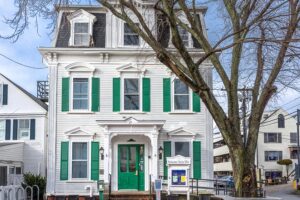
But these artifacts — and more materials stashed far and wide — are the town’s history. And the Provincetown Historical Commission, along with local history buffs, says it’s time to take the artifacts out of storage and display them for the public.
That’s the case Julia Perry, chair of the historical commission, and local historian Lisa King brought to the select board at its Jan. 8 meeting, where they proposed an ambitious plan calling for a major renovation to the historic Freeman building at 330 Commercial St. and the creation of a new town history museum.
Perry told the select board that the historical commission proposes to lead a fundraising effort to cover the cost of renovating the building, setting up the new museum, and staffing it.
An Inventory of Curiosities
On a recent visit to the firehouse’s attic, one interesting find was a “radioptican” — a projector from the early 1900s used to view images on glass negatives.
“It’s like tripping back in time,” said King as she peeked onto shelves and into piles of labeled boxes containing everything from family papers and postcard collections to flags and buntings used on holidays.
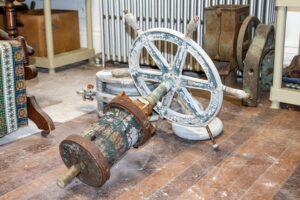
A 19th-century child’s carriage held a macabre-looking assortment of hands. Made of wax, the hands belong on a series of figures crafted for the Heritage Museum by artist Mary Bono in the late 1970s and early 1980s. According to Perry, the figures had to be dismantled because of lack of space. The heads and feet are being stored elsewhere.
Among the wax figure collection were a librarian, a mother and child, a pharmacist, and a seated Portuguese fisherman holding a coiled rope. Local lobsterman Irving Roderick was the model for the fisherman, and Bono took plaster casts of his head, hands, and feet, according to a 1983 article in the Provincetown Advocate on the Provincetown History Project’s website. Roderick’s wax head has gone missing since the collection went into storage, but Perry holds out hope it will turn up.
Several boxes held material from past Blessing of the Fleet celebrations as well as other contributions from the town’s large Portuguese community, such as a cross stitch of São Miguel, fishermen’s shrines, and a shadow box featuring flowers made from shells and mounted on velvet.
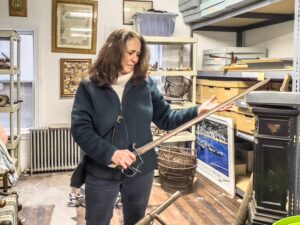
King carefully hefted a long, rust-encased sword that had belonged to Edward Clark Burt, the first Provincetown man to enlist in the military at the start of the Civil War.
“It’s still sharp,” said King, who wondered whether lives had been lost to that blade.
In addition to the labels on the artifacts and storage boxes, there is an inventory list that was compiled when the materials went into storage. While the list contains 624 entries, some items are not on it, Perry said.
The Loss of the Heritage Museum
The Provincetown Heritage Museum opened on July 4, 1976 in the former Center Methodist Episcopal Church building that now houses the Provincetown Public Library. Josephine Del Deo, who with her husband, Sal, and others successfully lobbied for the town’s purchase of the building and its subsequent use as a museum, served as the museum director from 1976 until 1995. She also generously contributed to the museum’s collection.
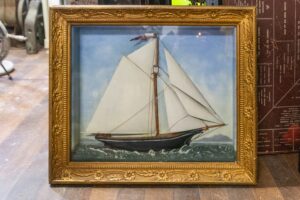
According to the library’s history of the building, the museum was open seasonally and run by a small staff and “a dedicated group of volunteers” through the summer of 2000.
The library, meanwhile, was in the Freeman building, at the corner of Freeman and Commercial streets.
In its later years, the number of visitors to the museum gradually declined, while the number of library patrons grew. Town meeting voted to convey the museum site at 356 Commercial to the board of library trustees in 2001 to house the library. That’s when the artifacts from the Heritage Museum went into storage.
Paintings and other artwork from the Heritage Museum’s collection are displayed in the town hall and other municipal buildings. The half-scale replica of the schooner Rose Dorothea, built by Francis “Flyer” Santos for the old museum, remains on the second floor of the public library as a tribute to local fishermen and a reminder of the former museum.
The Proposal
The building at 330 Commercial was deeded to the town by the Freeman family in 1873 with a condition that it be used for educational purposes. Perry told the select board her commission is aware that a major renovation of the building would be needed to create a museum there.
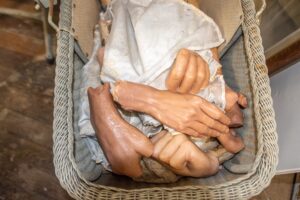
“The cost will be high, but my experience on the historical commission has shown me the great love that the public — here and throughout the country — has for Provincetown history, and most importantly, their willingness to support it,” she said. Perry estimated that the building may need some $5 million in repairs.
Perry described display and office space on the first floor, storage and a small studio for lectures and interviews for airing on community television on the second, and a storage and reference center on the third.
King, who was born in Provincetown and oversees a Facebook page called “My Grandfather’s Provincetown,” said she has been approached by several local people willing to donate or lend their collections to the town. For those people, she said, “Most important is that their collections stay in town.”
David W. Dunlap, a former New York Times reporter and author of Building Provincetown and The Provincetown Encyclopedia, said he would like to donate the fruits of his extensive research to the town — if a permanent archival repository is established, according to King. And Salvador Vasques is said to have offered to ship his extensive collection of Provincetown postcards, books, documents, and photographs from his current home in California to the planned Provincetown history museum at his own expense.
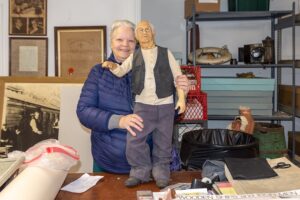
According to King, Samuel Tager, executive director of the Provincetown Public Art Foundation, has offered the benefit of his expertise as former longtime exhibit director of Harvard University’s Peabody Museum and member of the management team for other museums at the university.
After the meeting, King said that while social media sites such as the one she maintains, the Provincetown Diaspora page administered by Ben Kettlewell and Steve Silberman, and Salvador Vasques’s My Provincetown Memorabilia page are helpful, it is also important to have the town’s historical items on view.
A Museum Without a Curator
While the current effort is to establish a town-owned museum, the Pilgrim Monument and Provincetown Museum, a private enterprise overseen by a nonprofit called the Cape Cod Pilgrim Memorial Association, has its own collection of artifacts and documents related to the town’s history.
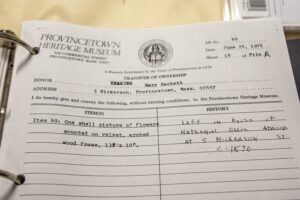
The museum, however, has lacked a curator for the last several years, halting the acquisition of most materials.
“We didn’t have a curator when I arrived in January 2017, and the last curator was well before that,” said Executive Director David Weidner. “We really have no active curatorial process to receive collectible goods.” Lack of space is also a factor, he said. The museum hasn’t accepted any documents since 2020, Weidner said, and artifacts are considered “case by case.”
Inquiries, too, Weidner said, go unanswered for lack of a curator. For example, one came recently from Oxford University. “I couldn’t provide them with the information they needed but advised them to check the Provincetown History Project,” he said.
The history project is not connected to the Pilgrim Monument museum.
Perry recently proposed to her fellow commissioners that they consider exploring the acquisition of items in the Monument museum’s collection that are no longer displayed.
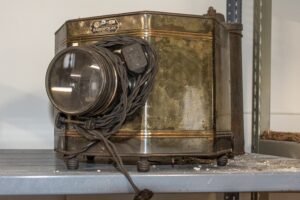
Weidner would not comment on Perry’s proposal. Doing so would be premature, he said, since he had not yet discussed it with her.
Based on her local conversations, King said the public and the Monument museum don’t see eye to eye on what to do with historic objects. After making donations, “People hoped to see their treasures on display,” King said, but instead “their artifacts sat in storage unseen for years.”
The rift goes back to the early 1980s and “has grown wider and deeper,” she said. “This is another reason the town needs its own museum.”
‘A Notion Worth Pursuing’
While the select board reacted favorably to Perry’s proposal on Jan. 8, Town Manager Alex Morse brought up some obstacles in an email to the Independent.
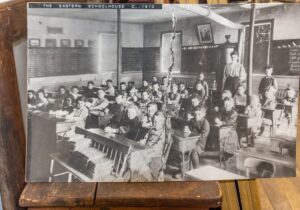
“The Freeman Street building could be an interesting option to explore, however, it is currently fully occupied and houses the Town’s Tourism Department as well as Provincetown Community Television,” Morse wrote. “We are aware of deficiencies with the building’s exterior, as well as interior needs in the building — both of which will require extensive and expensive investigation, repairs, and restoration.”
Funds to assess the building’s condition are in this year’s capital improvement plan, he said.
“Town staff will work with the select board and community stakeholders to determine the future feasibility of the Freeman Street building or other sites in town for housing a museum in the coming years,” Morse added.
Local support for a history museum appears strong. “Efforts to preserve our seafaring, art making, and unique history of acceptance must be active,” wrote Tager in an email to the Independent this week. “It is critically important for this community to rise to this moment and ensure that the facilities and resources are in place to support the ongoing work of local historians.”
Dunlap offered his qualified support, saying the town “could certainly use an archival center where the public has access — physically and/or digitally — to thousands of historical artifacts and documents that don’t currently have a home, or are housed many miles away, or sit in flooding basements and leaky attics.
“Though questions abound about governance, finance, continuity, acquisition, security, and collaboration with other cultural institutions and town government, it’s a notion well worth pursuing,” Dunlap said.
